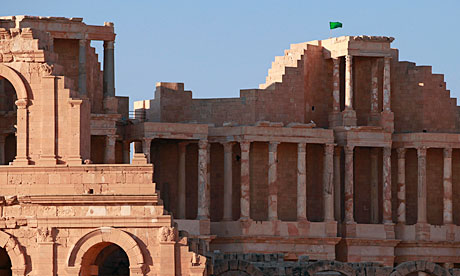
@autodroolautodrool
Libya #rebels claim Roman city of Sabratha from regimejijr.com/hFLv
Libya rebels claim Roman city of Sabratha from regime
Anti-Gaddafi forces take perfectly preserved ancient marvel, saying that regime cared little for people or heritage

A Libyan national flag is pictured flying over the ruins of a theatre in Sabratha. The flag was torn down by opposition fighters. Photograph: Bob Strong/Reuters
It is one of Libya's most extraordinary tourist attractions. The 2,000-year-old Roman city of Sabratha is one of the most perfectly preserved from the ancient world. It has temples, a forum, and a stunning theatre looking down on the turquoise Mediterranean with its softly lapping waves.
On Friday a small platoon of opposition fighters officially liberated it – climbing up the back of the theatre's spectacular colonnaded facade. At the top they tore down the green flag fluttering above the ruins – a symbol of Muammar Gaddafi's hated regime, still clinging on to power some 45 miles down the coast.
"Gaddafi suppressed history. Most of history before 1969 disappeared from here," Sefakes Faties, a 23-year-old medical student said, surveying a landscape of acanthus columns and a temple to Dionysius. "Everything has been removed from reality. Nothing is real anymore. Gaddafi manipulated our history. Now we want our history back."
Libya's other stunning archaeological site, the Roman city of Leptis Magna, lies near Zlitan – east of Tripoli – which rebels claimed control of on Friday .
In the Sabratha theatre's giant auditorium the rebels tried to set light to the flag. Behind them were a series of exquisite Roman panels. They depicted muses, gods, three fleshy graces – one with an impressive bottom and another holding an oval mirror and a series of masked comedy actors. The flag failed to catch fire, so the fighters stamped on it instead.
Faties said he last visited Sabratha a decade ago on a school trip. For the past four months he has been fighting the regime in Tripoli. The rebels' spectacular advances over the last week meant that he was now closing in on his home town of Zuara, a few dozen miles west of Sabratha along the coast, and a strategic highway now in opposition hands.
Anti-Gaddafi forces took Sabratha on Wednesday following a furious three-day battle, with mortars and anti-aircraft guns raised across the main streets. Bullet holes pockmarked the Italianate church and white-and-pistachio painted town hall. The rebels seized a central building and cafe – its upper storeys a smoking ruin – then advanced under fire to the city's four-star hotel.
One of the rebel protagonists was Akram Mohamad, 43, an MOT tester from Manchester. Mohamad is an anti-Gaddafi activist who returned to his homeland from the UK two months ago. He said the battle ended at 7am on Wednesday when Nato pulverised Sabratha's military camp. "Mr Nato came and put six missiles on to it," he said, adding: "Without the coalition we would not be winning. Everyone knows that."
On Friday the camp was a squashed concertina of masonry and twisted metal. The bombs landed directly on the officers' mess. Two Gaddafi soldiers were killed, Mohamad said, with others running away. The camp's pump house survived the blast; inside a fuel log lay on a table, with the last entry from 5 July. Someone had dug a foxhole with sandbags. There was an abandoned boot.
At the $180-a-night Gamer Sabratha hotel the glass entrance doors miraculously still opened. In the lobby opposition militia were sleeping on orange sofas. Tourist posters adorned the walls. They included photos of Libyan attractions and enticing slogans in English – "I love Libya", "Welcome to archaeology, Libya is a daydream" and "Serenity and harmony, fascination and emotion".
The rebel spray painters, however, had already got to work. Next to the posters were new slogans in Arabic, "Free Libya" and "Down with Gaddafi".
A trail of blood led to the roof where one fighter had been injured by a rocket-propelled grenade. Amazingly the hotel's manager, Mohamad Benoba, 50, was back at his desk. "I'm so happy. We've had 40 years of injustice," he said. How long before the tourists returned? "Maybe a year," he suggested.
No one, of course, knows when the Gaddafi regime will collapse. But the rebels are now closing in with fighters claiming control of Zlitan, and recent advances from the south and west. Fighting is continuing in Zawiyah, 30 miles west of Tripoli, and the frontline since last Saturday in Libya's tumultuous six-month revolution.
Government flags lay on the main road next to torn up copies of the Green Book, Gaddafi's eccentric treatises on political philosophy. The copies – prepared by "the world centre for studies and research of the Green Book" – were in several languages, including Russian, and included several arresting phrases: "Parliament is a fortification of democracy" and "Democracy is a direction of the people, and not people's self-expression". Nearby there was the stench of rotting meat from abandoned shops.
Back at the theatre Faties said he hoped the new Libya would take better care of its antique heritage – Phoenician, Greek, Roman, Byzantine. "It's so ancient. Everything has been changed by the years. From now on we will preserve it and look after it."
